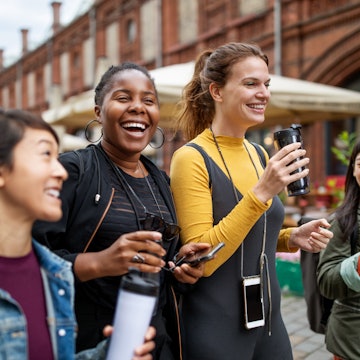

Do you need a vaccine passport to travel? © Portishead1 / Getty Images
As travel resumes in many places around the world, one thing helping to facilitate the return is “vaccine passports.” The phrase means different things in different places—but it usually describes physical or electronic documentation that allows people who have been vaccinated against COVID-19 to prove inoculation in order to travel.
In some countries, including Germany, France and Ireland, the same system is used to show a recent negative COVID-19 test or recovery from the disease, as well as vaccination status—a condition for entry into restaurants and cultural sites. Some cities are also instituting their own passes, like New York and Los Angeles. But do you really need one? And how do you get one? We break what you need to know.
What’s a vaccine passport?
Vaccine passports—or digital health certificates—are usually either displayed as a QR code on a mobile phone (via a dedicated app or as a PDF kept in the phone’s file storage, your email, or so on) or as a paper printout, usually with that same QR code. When it comes to travel, these are already widely used in Europe and Asia, but this differs from the US system in particular, where the vaccine record is a simple piece of paper with your vaccine information.
By and large, vaccine passports are only standardised and interoperable in the European Union (EU) and associated European Economic Area countries (like Switzerland, Iceland and Norway), where—for example—a French person can show their QR code across the border in Germany, Switzerland or Spain as if they were at home.
Read more: Everything you need to know about the EU's digital COVID-19 certificate
This standard, the European Union Digital COVID Certificate, is in pole position to become a wider standard, with several non-EU countries, like Israel, Morocco and Panama, designing their national systems to be interoperable with it. The airline trade association IATA the latest to back the system as a wider standard.
Where do I need to use a vaccine passport?
There are two general situations where you’ll need to show a vaccine passport: first, at the border of a country that requires proof of vaccination, and second, within a country to be allowed to participate in certain activities or events like dining in a restaurant, visiting a museum or entering a nightclub or concert space.
Read more: How to manage vaccine certifications and COVID-19 passports for international travel
This distinction between the passport for “border” and “activities” is important. In some cases, countries accept a wider range of proof of vaccinations at the border than for activities: many will accept the US vaccination card to enter the country, but not to eat at a restaurant.
For the border, you’ll need to do some careful research for each country’s requirements for entry. For example, if you’re a US traveler coming to France, you’ll want to check the US embassy in France’s site, the US State Department’s travel advice pages, and the French foreign ministry’s advice at a minimum.
For the “activities” part, you have three options.
The first is to try your luck: a smile, a bonjour and perhaps a prepared explanation in the local language via a translation app may see a kindly restaurateur allow you in, but they’re within their rights to say you’re not allowed in.
The second is to get a test every few days and to add your negative test into the local app. This often allows antigen or PCR tests. Antigen tests tend to be cheaper, but double-check what is allowed in the local area.
Read more: This is how tourists can access France's health pass
The third is, where there is a local system in place to convert and digitise your overseas vaccination proof to a local version, to use that.
How do I get a vaccine passport that works in France, Germany, the UK or elsewhere?
In some cases, there is a process to convert overseas COVID-19 vaccination certificates to a local equivalent, which allows you to show it for “activities”—like going to a bar, restaurant or museum. This will depend on where you were vaccinated and the country (or even region) you are going to, so be prepared to do a lot of Googling for the very latest information. English-language news sites like The Local across Europe or The Connexion in France can be very helpful here.

In Germany, this involves heading to a local pharmacy to convert your international proof of vaccination into a German one. This can often be done at airport pharmacies—enquire ahead of time via the airport’s contact number or social media. In France, there’s an online system, which replaced the pharmacy option. In Ireland, it requires contacting the government service centre.
Frustratingly, some countries don’t make their digital vaccine passport apps available in some international app stores: on iOS devices with US-based accounts, France’s TousAntiCovid app is available but Germany’s Corona-Warn-App is not.
Read more: Everything you need to know about PCR tests
You may, however, be able to import a German certificate into the French app, or it may be easier to save a picture of the certificate to your phone for safe keeping and ask for an extra couple of paper copies.
For more information on COVID-19 and travel, check out Lonely Planet's Health Hub.
You may also like:
9 expert tips for a safe road trip during the pandemic
What do I do if my flight gets cancelled—and can I get a refund?
PCR tests for travel: everything you need to know














